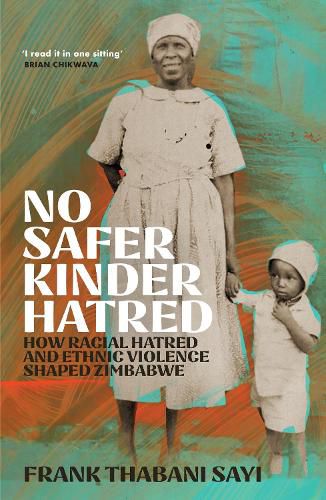Readings Newsletter
Become a Readings Member to make your shopping experience even easier.
Sign in or sign up for free!
You’re not far away from qualifying for FREE standard shipping within Australia
You’ve qualified for FREE standard shipping within Australia
The cart is loading…






Frank Sayi grew up in Rhodesia, now Zimbabwe, in the 1970s. His childhood straddled two very significant periods in his country's history, both of which heavily influenced his memoir. The first was the war of liberation (1975-1979), closely followed by the post-independence internecine war (1981-1987).
Crucially, Frank was raised in a native reserve in colonial Rhodesia, a country under white minority rule, governed by Ian Smith's racist and illegal regime. Native reserves were places of repression, and containment-replete of hope.
Frank and his two older sisters, Thoko and Gift, lived with their grandmother, a stern, wise, mercurial matriarch, capable of intimidating severity, and her son Uncle Sami. Frank's mother, the main breadwinner, lived in the city. Frank and his siblings didn't see much of her; in his mind she was just another sister.
The memoir is intricately woven around the lives of the members of Frank's immediate family, whom he uses to foreground the tragic lives of a people caught within the web of war.
Their lives were extremely hard. During the war a dusk-to-dawn curfew was declared, schools were closed, and food supply chains and clothing contaminated with poison. Thousands of refugees fled the warring factions. There seemed to Frank to be no difference between government soldiers, various law enforcement agencies, and the guerrillas fighting for freedom: they were all men of violence, who terrorised the civilian population.
However, by June 1979 there was a brief hiatus in fighting. And after protracted negotiations, Blacks gained their independence from white rule in April 1980. The country had a new name: Zimbabwe; Blacks welcomed a new national anthem-Nkosi sikelel'Africa! - God Bless Africa - but after an extra-ordinarily convenient discovery of an arms cache was made on a farm in Matabeleland, the stronghold of the opposition, Robert Mugabe declared total war on Matabeleland. He unleashed Gukurundi, his North Korean-trained partisan army on the Ndebele people who hadn't voted for him. Simply put, this was a war of retribution.
By 1982 Frank had joined his father's family in N'kayi, one of the areas to experience the most intense violence and massacres by Gukurahundi soldiers. By using scorched-earth tactics, they brought famine, disease, murder, rape, and terror.
Within their first week of deployment, they'd ruthlessly dispensed with more than 2000 lives.
And as a silhouette of war, Frank's memoir showcases human capacity for extra-ordinary violence, but also, compassion, endurance, survival and the triumph of the human spirit. It binds together the narratives from two wars and acts as lens through which the implications of politica
$9.00 standard shipping within Australia
FREE standard shipping within Australia for orders over $100.00
Express & International shipping calculated at checkout
Frank Sayi grew up in Rhodesia, now Zimbabwe, in the 1970s. His childhood straddled two very significant periods in his country's history, both of which heavily influenced his memoir. The first was the war of liberation (1975-1979), closely followed by the post-independence internecine war (1981-1987).
Crucially, Frank was raised in a native reserve in colonial Rhodesia, a country under white minority rule, governed by Ian Smith's racist and illegal regime. Native reserves were places of repression, and containment-replete of hope.
Frank and his two older sisters, Thoko and Gift, lived with their grandmother, a stern, wise, mercurial matriarch, capable of intimidating severity, and her son Uncle Sami. Frank's mother, the main breadwinner, lived in the city. Frank and his siblings didn't see much of her; in his mind she was just another sister.
The memoir is intricately woven around the lives of the members of Frank's immediate family, whom he uses to foreground the tragic lives of a people caught within the web of war.
Their lives were extremely hard. During the war a dusk-to-dawn curfew was declared, schools were closed, and food supply chains and clothing contaminated with poison. Thousands of refugees fled the warring factions. There seemed to Frank to be no difference between government soldiers, various law enforcement agencies, and the guerrillas fighting for freedom: they were all men of violence, who terrorised the civilian population.
However, by June 1979 there was a brief hiatus in fighting. And after protracted negotiations, Blacks gained their independence from white rule in April 1980. The country had a new name: Zimbabwe; Blacks welcomed a new national anthem-Nkosi sikelel'Africa! - God Bless Africa - but after an extra-ordinarily convenient discovery of an arms cache was made on a farm in Matabeleland, the stronghold of the opposition, Robert Mugabe declared total war on Matabeleland. He unleashed Gukurundi, his North Korean-trained partisan army on the Ndebele people who hadn't voted for him. Simply put, this was a war of retribution.
By 1982 Frank had joined his father's family in N'kayi, one of the areas to experience the most intense violence and massacres by Gukurahundi soldiers. By using scorched-earth tactics, they brought famine, disease, murder, rape, and terror.
Within their first week of deployment, they'd ruthlessly dispensed with more than 2000 lives.
And as a silhouette of war, Frank's memoir showcases human capacity for extra-ordinary violence, but also, compassion, endurance, survival and the triumph of the human spirit. It binds together the narratives from two wars and acts as lens through which the implications of politica